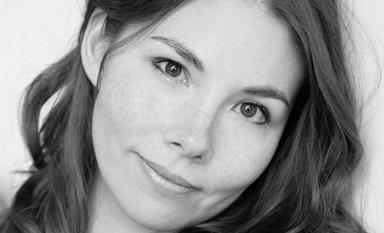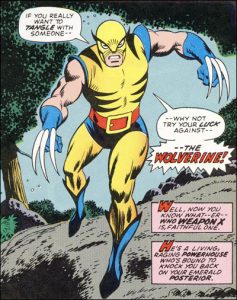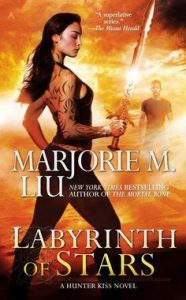Interview with Marjorie Liu – Myths, Morals and Sex Symbols
Hi Nerdspanners! Robert here.
Confession time – and this is an odd one from your comics correspondent. I NEVER read comics growing up. Not one. I was strictly a book guy. I’d loved Batman: the Animated Series and the ’90s X-Men Cartoon (and its cousin ’90s Spider-Man), but comics were outside my oeuvre. It wasn’t until I first picked up a copy of Watchmen when I was at law school…
But I digress.
I’m not opening with this little personal anecdote because I’ve forgotten what you’ve clicked on this page to see, but rather because this is an important shared experience with noted comics writer Marjorie Liu.
Like me, she discovered comics during her university days, inspired in part by her love of the characters from animated shows. Once she had cracked the cover, it only took a little while to demonstrate to her that something richer waited in the bright panoply of shared world comic books, and for writing in general.
I’m sure you can understand why I’ve been a fan of Marjorie’s work for some time. Everyone loves a kindred spirit.
Marjorie brings a literary sensibility to her comics. This is unsurprising as she has another writing life entirely – an incredibly prolific novelist in what is perhaps now the most popular genre in the world, paranormal romance/urban fantasy. (Compared to which, we poor comic fans are but sand dunes to a mountain). Her success there led her into writing X-Men novels, and finally, X-Men comics. The rest, as they say, is history.
As one of the principal female writers in mainstream ‘Big Two’ comics, she provides an incredibly vital perspective, not only as a woman writing superhero fiction, but also as a cross-genre success who writes other fiction predominantly for women. Marjorie took animation tie-in character X-23, and turned her from what might otherwise be a “gimmick” character into a notable fan favourite. She then had lightning strike twice with Daken, yet another Wolverine off-shoot that (along with co-writer and character creator Daniel Way) she crafted into a viable and notable force. Black Widow, Northstar and Psylocke, amongst others, have all benefited from her deft touch. As the Marvel Universe continues to reshape itself, her voice (along, of course, with many others) is becoming notable in setting the tone for what the next generation of the Marvel U will look like.
Lawyer. Diplomat. Novelist. Web designer. Biomedical Ethicist. Polyglot. Polymath – and, fortunately, featured guest at the Brisbane Writer’s Festival in Australia. David got a chance for a comprehensive sit down with her during that visit, and despite both being up all night, they managed to find some insight through the caffeine haze.
________________________________________________________________________________
Walker: We share a bit of common history, we’re both law graduates that didn’t go into practice. What, for you, was your breaking point? Why did you get out?
Marjorie Liu: Ugh… what wasn’t? I had always wanted to be writer. I had always wanted to be an artist in some capacity, but I am – probably for the better – a practical person and I knew that I had to be able to pay the bills and being a writer won’t necessarily do that. So I went to law school. I loved law school, but I knew immediately I wasn’t going enjoy being a lawyer. So even throughout law school, I was searching for different jobs that I could do using my law degree.
But again, I still had that dream of being a writer. So after I was admitted to the bar, while looking for work, I had a lot of free time on my hands — and thought, “Well, it is now or never.” So I sat down and wrote the book, start to finish. It sounds ridiculous, but I was very highly motivated, and I’d been trying to finish a novel for years, though I had never finished anything until then. Finally, though, an idea was in my head – and it was the right time. I revised the novel and eight months later I sold it.
So, I mean, the turning point for me in not practicing law was finishing the book, more than anything else.
Walker: I loved law school too. So many interesting ideas and perspectives. One that always stuck with me was Carrie Menkel-Meadow’s essay, ‘Portia in a Different Voice’. I’m not sure if the Feminist Theory of Conflict Resolution would be covered in the American curriculum, but the idea that women approach conflict from a collaborative perspective rather than an adversarial win-loss perspective is something that seems to have a lot of relevance to comics.
Marjorie Liu: [laughs] Its funny, because we actually never covered that in law school.
Walker: Yeah, fair enough. As a writer, you certainly seem to focus more on relationships and character growth than on a battle royale between Team Good and Team Evil. Do you consciously write to a perspective of how conflicts should be solved?
Marjorie Liu: No. [laughs] Gosh, certainly nothing that formal. But I do prefer to write character-based stories. I wouldn’t subscribe to any theory about a right way to resolve conflict, but I do think stories should be motivated by character and everything should be organically based on character. Obviously, I love reading comics, but for me the least interesting thing is the big fight. What always fascinated me were the character moments and little asides, so I just write what I love.
Walker: Speaking of writing what you love, there has been a lot of talk recently – Morrison’s Supergods, the renaissance of appreciation for Jack Kirby’s contributions to the medium – about comic book characters as a modern mythology. As a writer who works fluently and frequently with real-life myths, how much do you buy into the idea that comic book characters are a sort of modern pantheon around which people build their lives? How much does that idea resonate with you?
Marjorie Liu: I think ‘myth’ is a very fair word to use. If one thinks about superheroes as particular representations of us… if you see them as archetypes of ideals or possibilities, representations of what we ideally want ourselves to be… or I suppose, even as how we see ourselves as human, flaws and all, then that is modern myth, that is a larger-than-life creation that can definitely inspire us in ways that affect how we live our lives.
When I was a kid –or not even when I was a kid, when I was in college or law school — I would think about Superman. Superman was larger than life, and not only did he have all these amazing super-powers, but he was good. He was a good guy, always a good guy.
Walker: Super-moral, as well as super-strong?
Marjorie Liu: Yeah, super-moral. And one couldn’t have super-powers or anything, but you could look to that goodness. Or the same thing with the X-Men, with the X-Men being a metaphor for tolerance, and not just in the… by standing against bigotry, but for other kinds of tolerance, where the X-Men show all the ways that characters… that people can be really flawed and yet, if you can look past that, still be heroic and admirable. And those are powerful representations.
Walker: Speaking of the superheroes as archetypes, you’ve done a lot of work with Wolverine and his different aspects and reflections over the years. You talked about Superman being an icon, but he dates back to around the 30s, Batman does as well. Wolverine is the most recent character to reach that sort of iconic status – I mean, he is only from, what, the late Seventies (ML: Yeah, exactly) and yet he is everywhere, we all understand him even if you’re not particularly attuned to comic books– what do you think it is about Logan that has let him stand out of the pack of characters created in the past forty years?
Marjorie Liu: Because he is so incredibly, incredibly flawed. Like, he is NOT super-moral. He is not innocent. He is this grumpy, occasionally homicidal loner type. And yet he still represents certain virtues we aspire to. He says what he means and means what he says. He is a loner, but as can be seen in his time with the X-Men, he is also incredibly loyal. If you are his friend, he will literally walk through hell for you.
In many ways, he is the most dependable of the X-Men, the most ferocious. It’s all these weird opposites. Homicidal, but merciful. Capable of intense hate but also of tremendous love. It makes him a very interesting character. Out of all these archetypal superheroes, he is very complex, and we’re drawn to that. To that…
Walker: Dichotomy?
Marjorie Liu: Yes, dichotomy. To there being all these sides to him.
Walker: I remember Chris Claremont saying something like if you walked into Logan’s bedroom, half of it would be a samurai shrine and the other half trashed with beer cans.
Marjorie Liu: That’s exactly it, isn’t it? Exactly. He is just a fascinatingly divided character. Because of all these sides to him, it allows writers to tell a huge range of stories, but readers… more importantly, it allows readers to fully engage with this character and imagine possibilities for Wolverine that you wouldn’t necessarily be able to do for a super-moral character. For a one-note character.
Walker: Wolverine’s first appearance – short, hairy, smelly, rude…
Marjorie Liu: Now he’s Hugh Jackman!
Walker: That’s exactly it! But even before that, there was distinctly written into the character a large element of sex appeal. Where did that start?
Marjorie Liu: Oh, wow.
Walker: I don’t mean ‘pick a year and issue number’ or anything. But where did that come from?
Marjorie Liu: That is a really good question. I think it’s for all the same reasons we were just talking about – he is complex, he has all these developed layers to his character. And I think complexity is sexy. But it isn’t just the complexity – it’s the warrior nature of him. His loner attitude, it creates a certain mystique. If you look at Clint Eastwood movies – a stranger walks into town, he is incredibly deadly. There is a mystery that surrounds him, there is something attractive about the mystery, and there is no question he is deadly, but there is something unmistakably attractive about that too.
Walker: So, the Man with No Name as a romantic lead?
Marjorie Liu: Sure. Maybe not in the story, but to the viewer, definitely, definitely.
Walker: You’ve written Black Widow, X-23, Northstar. Like Wolverine, these are relatively modern characters, but while they might not have that iconic omnipresence we were talking about, they nonetheless have decades of fairly baroque continuity behind them. How do you get to the emotional heart of a character with so much going on in their past?
Marjorie Liu: It is not easy sometimes. These characters have a huge amount of continuity, a huge amount of history behind them. It can be overwhelming, let’s just put it that way.
Walker: As writers go, you’re quite detailed – you’re very respectful.
Marjorie Liu: The only thing I can do is sit down with the character and pick out the pieces. I say “What is the most important thing to this character right now, at least as far as I’m concerned, with the stories I want to tell.” And then go from there. I do research. I certainly try to be true to the readers, try to be true to the history. I like things to make sense. But you can’t address everything, you have to focus on what you feel is most essential to the character in this moment in time.
Walker: Apart from being a superhero comics writer, you are also – perhaps, given your gangbusters success, predominately – a writer of paranormal romance and urban fantasy books. Obviously these genres have a lot of elements in common but in marketing and in fanbase demographics, they seem world’s apart. As someone who bridges this divide, do you see it as arbitrary, or is there something that really keeps them separate?
Marjorie Liu: It’s interesting. I don’t know if there has been much cross-over between the readerships. One thing the readerships do have in common is that both groups are incredibly loyal. Readers of romance and urban fantasy are predominately women, and they are incredibly loyal. They will stick with an author up and down. As long as you’re producing good books, your readers will be there.
And the same is pretty much true with comics. If they like your work, if it is good, they will stay with you over time, month after month, supporting you. It is a real blessing to have a readership that cares about your work and keeps looking out for it.
As far as the kinds of stories go, the differences between them… the stories in my novels are still character-based, but they are very different from what I am doing in the comics.
Walker: How so?
Marjorie Liu: Well, for one thing, they are way more romantic. For my paranormal romances, the story is concerned with the hero and heroine and their shared journey. Whereas with comics, not so much. Also, novels are long, around four hundred pages. The character work, the world-building, is far more extensive – simply because I have more room to play, and I’m not bound by outside continuity, as I am with characters at Marvel. Which is not a bad thing – I love playing in an established world – but it a very different situation.
Walker: That is interesting. A number of comic companies have made formal and informal comments about attempts at cross-pollination, about reaching out for these other pre-existing audience bases. Is this a quixotic quest, or just a matter of what they produce?
Marjorie Liu: What you produce, definitely. There is going to be someone who crosses over, attracts both groups. I think it is… I was speaking for me personally, from my experience. It is difficult to talk in generalities because of course there are those who read graphic novels as well as romance novels. I mean, people are reading across the board, reading anything that attracts them. But I think a crossover that appeals to both kinds of readers as a group is absolutely possible.
I do think one of the challenges is access to comics. At least in America, graphics novels and comics aren’t just everywhere.
Walker: It is pretty much the same here [ed: in Australia]. You might find a small section in the bookstore, but it isn’t reliable, and comic stores tend to be doing their own thing.
Marjorie Liu: Right. I think Comixology and the digital revolution of comics will help with that, but it takes time for people to realise that graphic novels are so easy to find. So maybe, as we go forward, that sort of appeal… cross-pollination, did you say?… might become more common. And now I’ve totally lost my train of thought, where I was going with that.
Walker: You’ve talked in the past about how important reading widely is to being a writer. What are you reading at the moment?
Marjorie Liu: I’m reading a wonderful book called Team Human. It’s by Justine Larbalestier, who is here at the Brisbane Writer’s Festival, and Sarah Rees Brennan. It’s like Twilight in reverse. Imagine Twilight, where Bella has fallen for a vampire, but the novel is told from the point of view of Bella’s best friend. So, in this story, the best friend can see the warning signs and problems for her vampire-smitten pal, and she has to work through it – should she help her friend? Should she not help her friend? Really, it’s a great book.
Walker: And what about you? What are you working on at the moment?
Marjorie Liu: Well, I literally handed in a novel yesterday. Well, last night. So I’m still a bit wired… ‘coffee, coffee, coffee.’ So I will probably go back to my hotel room tonight and start doing some tweaks to the ending so I can turn in the changes before my editor has a chance to read what I handed in.
Walker: Shiny new novel!
Marjorie Liu: It’s the fifth book in the Hunter Kiss series, called “Labyrinth of Stars”, and it’ll be out in March of next year. I am so glad to have it done.
Walker: I can only imagine. As a novelist, you have been pretty amazingly prolific over the years…
Marjorie Liu: Not so much of late. I was prolific for about eight years, but for the last couple of years, I had to take a break. Writing novels got tiring… I needed a year or two to rest, but now finally, I am back on the bandwagon. Which is something I’ll talk about in the workshop I’m running today – deadlines, writer’s block, finishing things…
Walker: Marjorie, thank you so much for taking the time to speak to me. Especially after a huge night, and being about to head off to run a class for another three hours.
Marjorie Liu: Hey, thank you. I wish my brain had been more… y’know. Less… [mimes melting onto the floor] I am so wired on coffee, still. I really am.






November 4, 2013
Fantastic interview! As a Liu fan who’s only read her comic work, I’m excited to start reading her urban fantasy / paranormal romance books. Already downloaded one to get started!